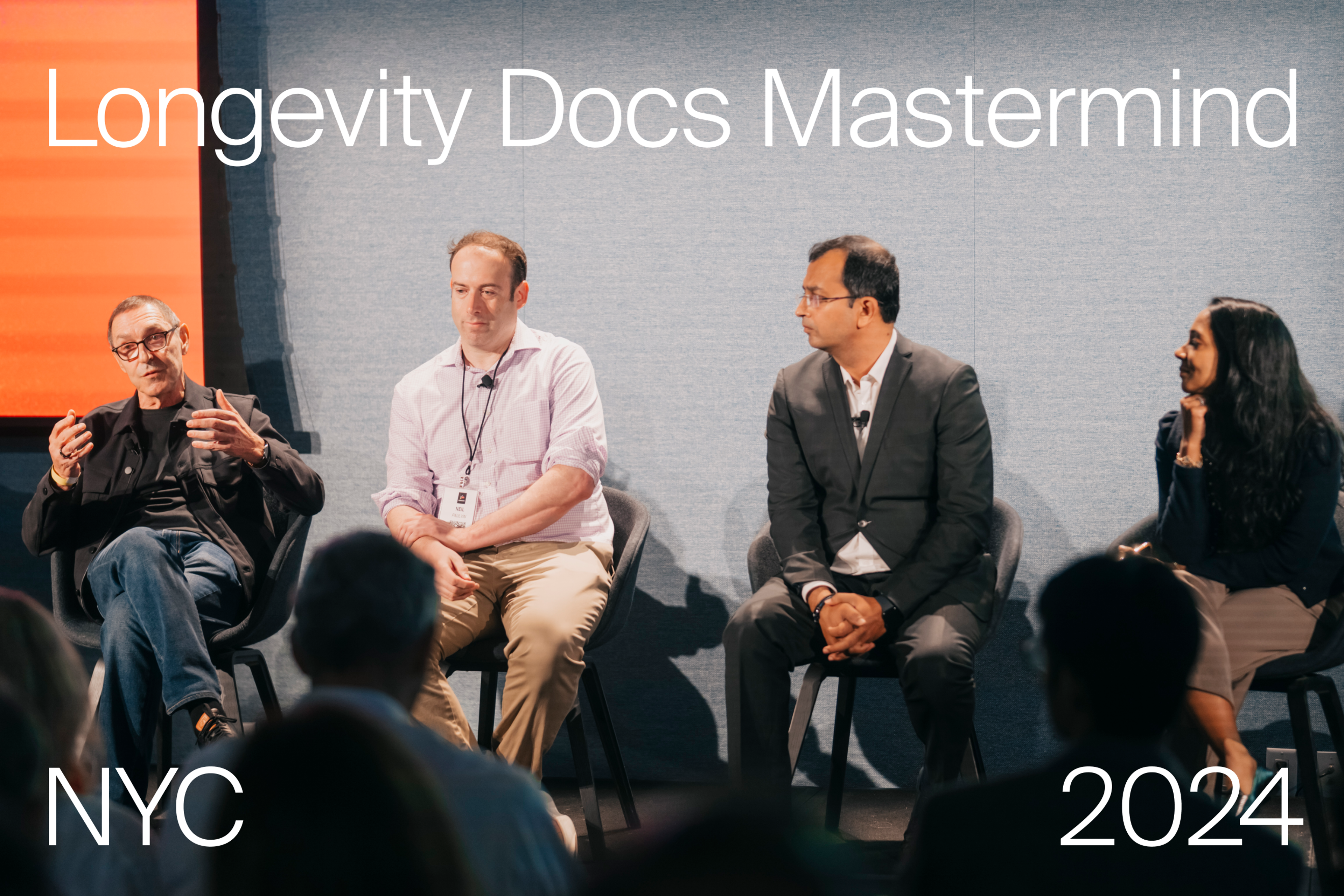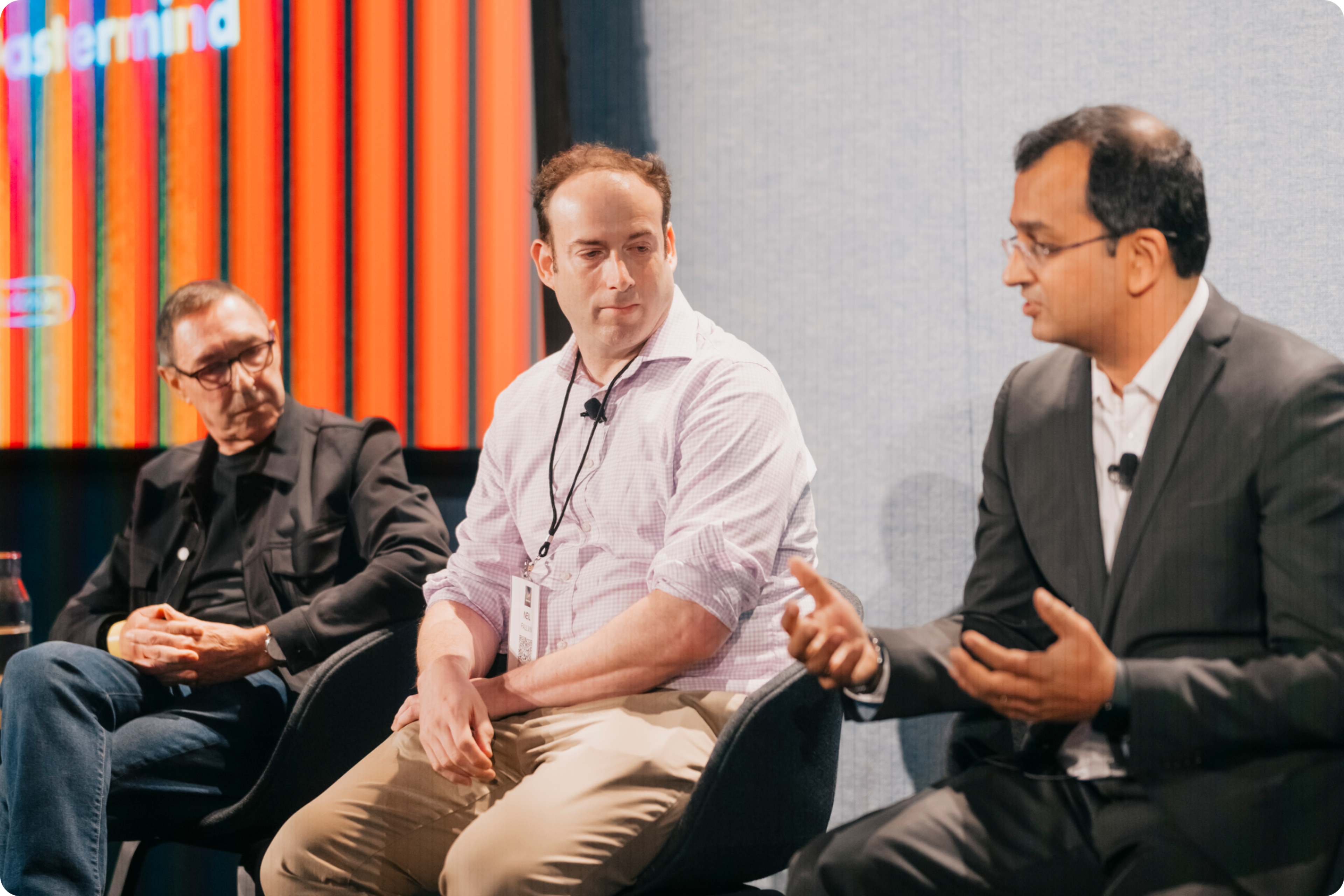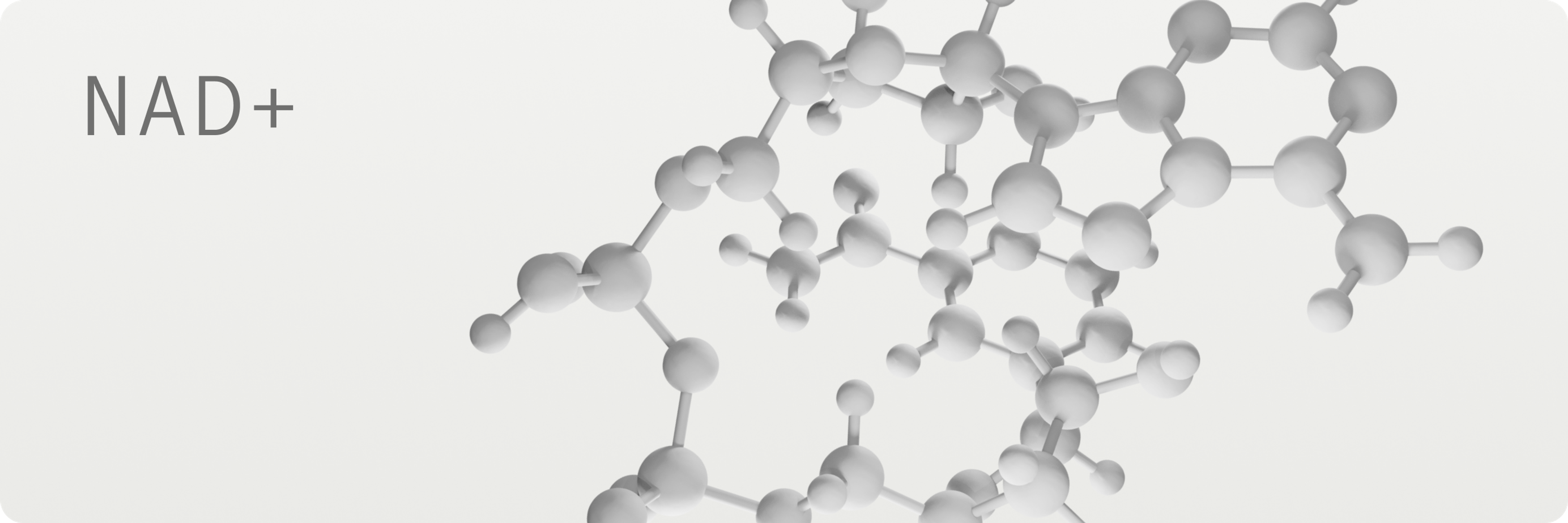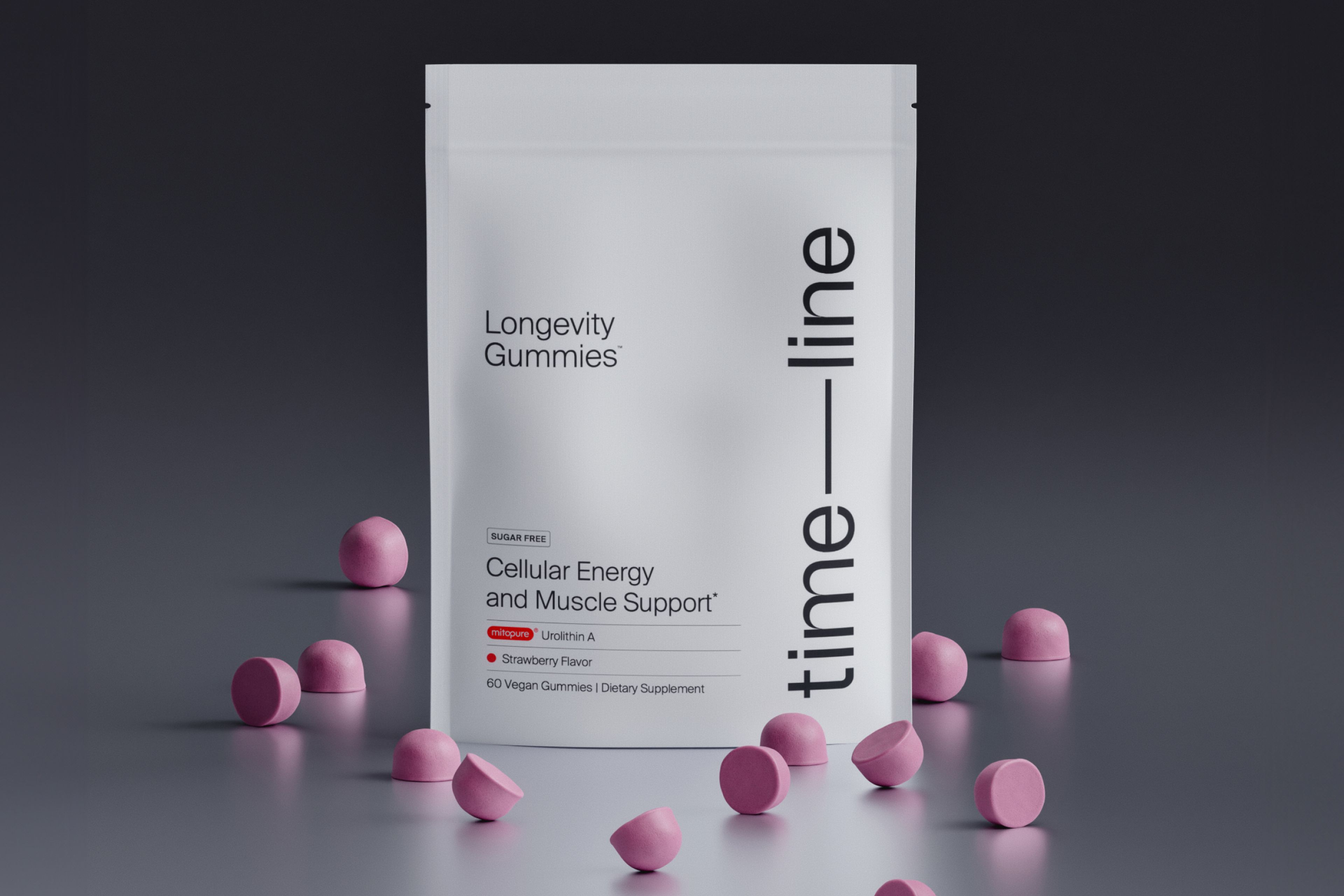Revolutionizing Aging: Insights from Longevity Docs
Discover groundbreaking insights from the Longevity Docs Mastermind Conference, revolutionizing aging and health with cutting-edge advancements.

What to know
Longevity medicine is an emerging field of medicine focused on extending health span through proactive care and the latest science.
Practitioners in this field focus on targeting the hallmarks of aging, including mitochondrial health.
Peptides, HRT, stem cells, and exosomes are some of the emerging therapies that longevity physicians are utilizing.
Technology like AI and wearable devices is transforming patient care with personalized treatments and early diagnostics.
Much of the scientific data on targeting the hallmarks of aging is from preclinical trials. However, Mitopure (Urolithin A) stands out for its robust clinical data.
Longevity medicine is an exciting, emerging field at the crossroads of disease prevention, health optimization, and innovative research. The goal of practitioners is to extend both the length and quality of human life. Unlike conventional medicine, which largely addresses existing symptoms and conditions, longevity medicine emphasizes proactive health management, early diagnostics, and targeted interventions to delay or prevent age-related decline.
With a focus on individualized care, longevity physicians leverage the latest advancements in biology, medicine, and technology to provide highly personalized strategies for enhancing well-being across the lifespan.
Recently, Dr. Anurag Singh, Timeline's Chief Medical Officer, and Jen Scheinman, MS, RDN, Senior Manager of Nutrition Affairs, attended the Longevity Docs Mastermind Conference—an exclusive gathering of leaders in longevity medicine who are shaping the future of this field.
Here are our top takeaways from this groundbreaking event, showcasing how insights from these pioneering physicians are driving the future of health.

Mitochondria in the Spotlight: Tackling Cellular Decline
Mitochondrial decline has emerged as a central focus in longevity science, and it is often recognized as a core hallmark of aging. As the “powerhouses of our cells”, mitochondria are essential for energy production, cellular function, and overall vitality. However, as we age, mitochondrial efficiency diminishes, leading to decreased cellular energy, increased oxidative stress, and chronic age-associated inflammation called inflammaging.
It’s no surprise that this topic was front and center, with multiple sessions addressing mitochondrial dynamics. Experts dove deep into the mechanisms driving mitochondrial decline and its impact on age-related cellular dysfunction.
An entire session was devoted to the interplay between mitochondrial decline, gut health, and longevity, focusing specifically on Urolithin A as a powerful tool for promoting mitochondrial function. Timeline's Dr. Anurag Singh, along with a panel of esteemed clinicians, discussed Urolithin A as an accessible, safe, and evidence-based option for practitioners looking to target cellular decline in their patients.
What is Urolithin A
Urolithin A, a postbiotic derived from certain dietary polyphenols, has been shown to induce mitophagy—a natural cellular process that removes damaged mitochondria and supports the production of new, healthier ones.
Mitopure®, the first clinically validated Urolithin A supplement, has been shown to increase cellular energy[1] and improve muscle strength[3] and endurance in human randomized controlled trials (the gold standard for research).[2]

NAD Therapy: Considerations and Controversies
NAD (nicotinamide adenine dinucleotide) use has surged in popularity among longevity specialists and wellness enthusiasts alike. From IV infusions to supplements with NAD precursors NMN (nicotinamide mononucleotide) and NR (nicotinamide riboside), this approach is believed to offer numerous potential benefits for cellular health and healthy aging.
NAD is a crucial coenzyme present in every cell, supporting fundamental processes like cellular energy production and DNA repair. However, NAD levels naturally decline with age, and this reduction is associated with decreased cellular energy and general cellular aging. [4]By replenishing NAD, proponents argue it’s possible to restore energy at the cellular level, aid DNA repair, and potentially slow down aspects of age-related cellular decline.
While NAD supplementation shows promise, it is not without its risks and considerations. Research was presented highlighting how excessive intake of the vitamin niacin (vitamin B3)—a component involved in NAD synthesis—can lead to cardiovascular issues and increased inflammation. As niacin breaks down, it generates byproducts such as 2PY and 4PY. The build-up of these metabolites has been linked to oxidative stress and inflammation within blood vessels,[5] potentially increasing the risk of atherosclerosis and cardiovascular disease.[6]
While NAD therapy holds significant potential, it’s essential to approach supplementation mindfully, particularly for individuals with pre-existing cardiovascular concerns.

Peptides: Potential, Promise, and Progress
Peptides, short chains of amino acids that act as powerful signaling molecules, have become central to advancements in longevity and performance medicine. Acting as messengers, peptides communicate within the body, modulating essential cellular processes such as inflammation, tissue repair, regeneration, and metabolic activity. They function as growth factors, neurohormones, and neurotransmitters, enabling precise regulation across numerous biological systems.
Physicians targeting performance and longevity are leveraging peptides in a therapeutic context, seeking to harness these signaling roles to support recovery, enhance physical performance, and potentially mitigate age-related cellular decline.
Well-known peptide medications are insulin and the new GLP-1 agonists like Ozempic (semaglutide) and Mounjaro (Tirzepatide ). Longevity physicians are also using peptides, such as PC-157 and TB-500, to support healing, reduce inflammation, and bolster immune and metabolic health.
While there is considerable excitement around peptides for longevity, much of the research is still in the preclinical stages. Although the data is promising, rigorous human trials are needed to fully validate their efficacy and safety.
Hormone Replacement Therapy
Hormone Replacement Therapy (HRT) has emerged as a vital intervention in the longevity space, with growing evidence suggesting its potential to improve quality of life, mitigate age-related decline, and promote overall vitality. This topic came up repeatedly throughout the conference as a way not only to address symptoms associated with declining hormones but also to keep vitality and youthful function as we age.
- For Women: Research highlights the benefits of HRT for managing symptoms of menopause, such as hot flashes and mood changes. Newer thinking is exploring the role of bioidentical hormones and personalized dosing to minimize risks and maximize benefits. There is also increasing interest in how estrogen and progesterone supplementation may support cardiovascular and brain health as women age.[7]
- For Men: Testosterone Replacement Therapy (TRT) is being used for its role in targeting the symptoms of andropause, such as muscle loss, decreased libido, fatigue, and mood changes. Recent studies suggest that TRT, when carefully managed, may improve metabolic health, support cardiovascular function, and enhance overall physical performance.[8]
Despite its promise, HRT is not without controversy. Discussions at the Longevity Docs Mastermind emphasized the importance of personalized care, starting at the appropriate times and ongoing monitoring to ensure the therapy’s safety and efficacy.
Lack of Human Trials: Challenges and Opportunities
While the field of longevity medicine is rapidly advancing, much of the research remains in its early stages, with many therapies. Experts took the stage to share promising data on stem cells and exosomes, two therapies garnering significant attention for their potential in tissue regeneration and cellular rejuvenation.
Amongst all the various interventions talked about, Urolithin A stood out for its substantial clinical data. With over 15 years of research and 11 human clinical trials, its benefits and safety profile are well-documented. Notably, Urolithin A has shown efficacy in supporting mitochondrial health and muscle function. Additional trials are currently exploring its potential effects on immune health, blood sugar metabolism, and other age-related areas, making it one of the most rigorously studied compounds in the field of longevity medicine.
Technology in Longevity Medicine: Innovations and Impact
Technology, including artificial intelligence, is rapidly transforming our world, including the medical field. From diagnostics to data management, AI-powered tools are making their way into clinicians’ offices, offering patients the most advanced care.
Longevity and performance physicians are at the forefront of this technological revolution, utilizing a variety of tools to enhance patient care. Wearable trackers, such as smartwatches and continuous blood glucose monitors, give real-time data to physicians, who then incorporate this data into a personalized treatment plan.
In-office tools, such as advanced imaging systems and AI-driven diagnostic software, enable physicians to detect conditions earlier and with greater precision. Furthermore, data management systems powered by AI help physicians manage and analyze vast amounts of patient data efficiently.
Longevity physicians are embracing technology to streamline patient care and target better outcomes for their patients.

Other Key Takeaways
In addition to the above topics, there was palpable excitement among both the speakers and the audience about the potential emerging technologies, including stem cells, exosomes, and biological clocks. While the research shows great promise, many agree that these technologies are not yet fully ready for mainstream application. However, a number of forward-thinking practitioners are already beginning to integrate them into their practices, paving the way for broader adoption in the future.
As we continue to explore and embrace these innovations, the goal remains clear: to empower individuals to live longer, healthier lives through personalized, proactive, and scientifically backed medical care. We are excited t see how this group of forward-thinking physicians is paving the way for a newly recognized field of medicine.
Authors

Written by
Senior Manager of Nutrition Affairs

Reviewed by
Chief Medical Officer, Timeline
References
- ↑
Andreux PA, Blanco-Bose W, Ryu D, et al. The mitophagy activator urolithin A is safe and induces a molecular signature of improved mitochondrial and cellular health in humans. Nat Metab. 2019;1(6):595-603. doi:10.1038/s42255-019-0073-4
- ↑
Singh A, D’Amico D, Andreux PA, et al. Urolithin A improves muscle strength, exercise performance, and biomarkers of mitochondrial health in a randomized trial in middle-aged adults. Cell Rep Med. 2022;3(5). doi:10.1016/j.xcrm.2022.100633
- ↑
Liu S, D’Amico D, Shankland E, et al. Effect of Urolithin A Supplementation on Muscle Endurance and Mitochondrial Health in Older Adults: A Randomized Clinical Trial. JAMA Netw Open. 2022;5(1):e2144279. doi:10.1001/jamanetworkopen.2021.44279
- ↑
Covarrubias AJ, Perrone R, Grozio A, Verdin E. NAD+ metabolism and its roles in cellular processes during ageing. Nat Rev Mol Cell Biol. 2021;22(2):119-141. doi:10.1038/s41580-020-00313-x
- ↑
Ferrell M, Wang Z, Anderson JT, et al. A terminal metabolite of niacin promotes vascular inflammation and contributes to cardiovascular disease risk. Nat Med. 2024;30(2):424-434. doi:10.1038/s41591-023-02793-8
- ↑
How excess niacin may promote cardiovascular disease. National Institutes of Health (NIH). March 11, 2024. Accessed October 29, 2024. https://www.nih.gov/news-events/nih-research-matters/how-excess-niacin-may-promote-cardiovascular-disease
- ↑
Wren BG. The benefits of oestrogen following menopause: why hormone replacement therapy should be offered to postmenopausal women. Med J Aust. 2009;190(6):321-325. doi:10.5694/j.1326-5377.2009.tb02423.x
- ↑
Barbonetti A, D’Andrea S, Francavilla S. Testosterone replacement therapy. Andrology. 2020;8(6):1551-1566. doi:10.1111/andr.12774

•
Nutrition•
First-of-Its-Kind Longevity Gummy Launched

•
Nutrition•
Studies•







